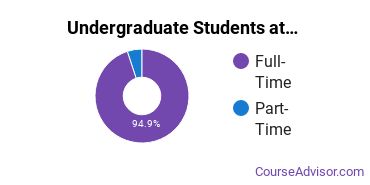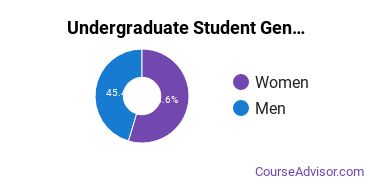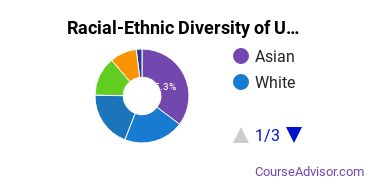University of California - Berkeley Overview
University of California - Berkeley is a public institution situated in Berkeley, California. Berkeley is a great location for students who prefer city over country life.
What Is University of California - Berkeley Known For?
10,551
Undergraduate Awards
$52,551
Avg Cost After Aid
- The highest award offered at UC Berkeley is the doctor's degree.
- In a recent academic period70% of the faculty were full-time.
- Students who graduate from UC Berkeley with a bachelor's degree make about $92,446 a year. That's 127% more than those who graduate from other schools.
- On average, it takes about 4.2 years for students from UC Berkeley to earn a bachelor's degree. This is excellent when compared to the average of 4.4 years.
Where Is University of California - Berkeley?

Contact details for UC Berkeley are given below.
|
Contact Details |
| Address: |
200 California Hall, Berkeley, CA 94720 |
| Phone: |
510-642-6000 |
| Website: |
www.berkeley.edu |
Request Information
How Do I Get Into UC Berkeley?
You can apply to UC Berkeley online at: admission.universityofcalifornia.edu/apply-now.html
Admission Requirements for UC Berkeley
| Submission |
Required? |
| High School GPA |
1 |
| High School Rank |
3 |
| High School Transcript |
1 |
| College Prep Program |
5 |
| Recommendations |
5 |
| SAT or ACT Scores |
3 |
| TOEFL |
1 |
How Hard Is It To Get Into UC Berkeley?
63%
Of Accepted Are Women
With an acceptance rate of 11%, UC Berkeley is one of the most selective schools in the country. If the admissions department requests additional materials, be sure to submit them promptly. This could be a sign that you're on the border line of being accepted or denied.
Approximately 37% of accepted students are men and 63% are women. The acceptance rate for men is 9%, and the acceptance rate for women is 14%.
Can I Afford University of California - Berkeley?
The overall average net price of UC Berkeley is $52,551. The affordability of the school largely depends on your financial need since net price varies by income group.
The net price is calculated by adding tuition, room, board and other costs and subtracting financial aid.
Student Loan Debt
Almost 66% of college students who graduated with the class of 2018 took out student loans, but that percentage varies from school to school. At UC Berkeley, approximately 21% of students took out student loans averaging $7,238 a year. That adds up to $28,952 over four years for those students.
Explore Best Ranked Schools for You
Explore the best ranked schools for the programs you are most interested in.
University of California - Berkeley Undergraduate Student Diversity
29,300
Full-Time Undergraduates
62%
Racial-Ethnic Minorities*
There are 30,799 undergraduate students at UC Berkeley, with 29,300 being full-time and 1,499 being part-time.

There are also 11,528 graduate students at the school.
Gender Diversity
Of the 29,300 full-time undergraduates at UC Berkeley, 46% are male and 54% are female.

Racial-Ethnic Diversity
The racial-ethnic breakdown of University of California - Berkeley students is as follows.

| Race/Ethnicity |
Number of Grads |
| Asian |
10,523 |
| Black or African American |
580 |
| Hispanic or Latino |
5,328 |
| White |
6,335 |
| International Students |
3,781 |
| Other Races/Ethnicities |
2,753 |
Geographic Diversity
California students aren't the only ones who study at University of California - Berkeley. At this time, 44 states are represented by the student population at the school.
Over 129 countries are represented at UC Berkeley. The most popular countries sending students to the school are China, South Korea, and India.
University of California - Berkeley Undergraduate Concentrations
The table below shows the number of awards for each concentration.
| Major |
Bachelor’s |
Graduate Certificate |
Master’s |
Doctor’s |
TOTAL |
| Computer Science |
994 |
0 |
10 |
46 |
1,050 |
| Economics |
909 |
0 |
2 |
33 |
944 |
| Cell Biology & Anatomical Sciences |
761 |
0 |
0 |
27 |
788 |
| Computer Information Systems |
737 |
0 |
5 |
0 |
742 |
| Electrical Engineering |
480 |
0 |
184 |
48 |
712 |
| Management Sciences & Quantitative Methods |
0 |
0 |
637 |
0 |
637 |
| Information Science |
0 |
0 |
599 |
3 |
602 |
| Natural Resources Conservation |
464 |
0 |
48 |
38 |
550 |
| Public Health |
202 |
0 |
295 |
5 |
502 |
| Mechanical Engineering |
188 |
0 |
233 |
42 |
463 |
| Business Administration & Management |
428 |
0 |
15 |
16 |
459 |
| Political Science & Government |
418 |
0 |
18 |
7 |
443 |
| Child Development & Psychology |
390 |
0 |
2 |
17 |
409 |
| Civil Engineering |
103 |
0 |
233 |
36 |
372 |
| Applied Mathematics |
264 |
0 |
80 |
5 |
349 |
| Law |
0 |
0 |
0 |
336 |
336 |
| Sociology |
294 |
0 |
21 |
14 |
329 |
| Legal Research |
0 |
0 |
324 |
0 |
324 |
| Operations Research |
63 |
0 |
194 |
9 |
266 |
| Communication & Media Studies |
265 |
0 |
0 |
0 |
265 |
| Cognitive Science |
257 |
0 |
0 |
0 |
257 |
| General English Literature |
240 |
0 |
2 |
11 |
253 |
| Non-Professional General Legal Studies |
234 |
0 |
0 |
0 |
234 |
| Biomedical Engineering |
113 |
0 |
88 |
15 |
216 |
| Chemical Engineering |
149 |
0 |
30 |
25 |
204 |
| Chemistry |
129 |
0 |
3 |
66 |
198 |
| General Biology |
168 |
0 |
3 |
26 |
197 |
| Other Social Sciences |
193 |
0 |
0 |
0 |
193 |
| Social Work |
81 |
0 |
103 |
4 |
188 |
| Statistics |
122 |
0 |
47 |
6 |
175 |
| Architectural Sciences & Technology |
0 |
0 |
169 |
0 |
169 |
| Physics |
110 |
0 |
18 |
39 |
167 |
| Fine & Studio Arts |
127 |
0 |
11 |
6 |
144 |
| Public Policy |
0 |
0 |
131 |
11 |
142 |
| Ethnic Studies |
112 |
0 |
10 |
9 |
131 |
| Film, Video & Photographic Arts |
112 |
0 |
9 |
5 |
126 |
| Mathematics |
96 |
0 |
5 |
23 |
124 |
| History |
105 |
0 |
7 |
9 |
121 |
| General Education |
0 |
82 |
21 |
17 |
120 |
| General Architecture |
106 |
0 |
5 |
2 |
113 |
| Nutrition Science |
104 |
0 |
0 |
3 |
107 |
| Linguistics & Comparative Literature |
88 |
0 |
7 |
11 |
106 |
| Philosophy |
98 |
0 |
1 |
3 |
102 |
| Materials Sciences |
28 |
0 |
42 |
31 |
101 |
| Other Engineering |
12 |
0 |
84 |
0 |
96 |
| Anthropology |
73 |
0 |
6 |
9 |
88 |
| International Studies |
80 |
0 |
7 |
0 |
87 |
| Optometry |
0 |
9 |
0 |
69 |
78 |
| Sustainability Science |
0 |
0 |
76 |
0 |
76 |
| Other Multi/Interdisciplinary Studies |
70 |
0 |
0 |
4 |
74 |
| Romance Languages |
58 |
0 |
8 |
7 |
73 |
| Microbiological Sciences & Immunology |
58 |
0 |
1 |
10 |
69 |
| Area Studies |
57 |
0 |
4 |
2 |
63 |
| Radio, Television & Digital Communication |
0 |
0 |
60 |
0 |
60 |
| Astronomy & Astrophysics |
46 |
0 |
7 |
3 |
56 |
| Music |
42 |
0 |
5 |
6 |
53 |
| Teacher Education Grade Specific |
0 |
0 |
52 |
0 |
52 |
| Writing Studies |
42 |
0 |
0 |
3 |
45 |
| Geological & Earth Sciences |
31 |
0 |
6 |
5 |
42 |
| Nuclear Engineering |
14 |
0 |
13 |
10 |
37 |
| Urban Studies |
35 |
0 |
0 |
0 |
35 |
| Drama & Theater Arts |
30 |
0 |
0 |
2 |
32 |
| Botany/Plant Biology |
20 |
0 |
1 |
9 |
30 |
| Educational Administration |
0 |
0 |
28 |
0 |
28 |
| Environmental Design |
24 |
0 |
0 |
0 |
24 |
| East Asian Languages |
17 |
0 |
0 |
4 |
21 |
| Classical & Ancient Studies |
16 |
0 |
2 |
3 |
21 |
| Engineering Science |
17 |
0 |
0 |
0 |
17 |
| Biochemistry, Biophysics & Molecular Biology |
0 |
0 |
0 |
14 |
14 |
| Neurobiology & Neurosciences |
0 |
0 |
3 |
11 |
14 |
| Biochemical Engineering |
0 |
0 |
14 |
0 |
14 |
| Landscape Architecture |
13 |
0 |
0 |
0 |
13 |
| Biomathematics & Bioinformatics |
0 |
0 |
3 |
9 |
12 |
| Classical Languages & Literature |
3 |
0 |
2 |
7 |
12 |
| Germanic Languages |
5 |
0 |
3 |
4 |
12 |
| Ecology, Evolution & Systematics Biology |
0 |
0 |
1 |
10 |
11 |
| Engineering Physics |
11 |
0 |
0 |
0 |
11 |
| Forestry |
7 |
0 |
4 |
0 |
11 |
| Environmental Engineering |
10 |
0 |
0 |
0 |
10 |
| General Engineering |
0 |
0 |
2 |
8 |
10 |
| Foreign Language, Literature & Linguistics (Other) |
4 |
0 |
1 |
5 |
10 |
| Slavic, Baltic & Albanian Languages |
5 |
0 |
2 |
3 |
10 |
| Physiology & Pathology Sciences |
0 |
0 |
2 |
7 |
9 |
| Demography & Population Studies |
0 |
0 |
6 |
3 |
9 |
| Dance |
8 |
0 |
0 |
0 |
8 |
| Middle Eastern Semitic Languages |
7 |
0 |
0 |
0 |
7 |
| Pharmacology & Toxicology |
0 |
0 |
2 |
4 |
6 |
| Urban & Regional Planning |
0 |
0 |
0 |
5 |
5 |
| Legal Professions (Other) |
0 |
0 |
2 |
2 |
4 |
| Other Education |
0 |
0 |
0 |
3 |
3 |
| Religious Studies |
1 |
0 |
0 |
2 |
3 |
| Plant Sciences |
0 |
0 |
2 |
0 |
2 |
| Special Education |
0 |
0 |
0 |
2 |
2 |
| Celtic Language & Literature |
2 |
0 |
0 |
0 |
2 |
| Atmospheric Sciences & Meteorology |
1 |
0 |
0 |
0 |
1 |
| Design & Applied Arts |
0 |
0 |
1 |
0 |
1 |
| Agricultural Economics & Business |
0 |
0 |
0 |
0 |
0 |
| Other Agriculture |
0 |
0 |
0 |
0 |
0 |
| Real Estate Development |
0 |
0 |
0 |
0 |
0 |
| Biological & Biomedical Sciences (Other) |
0 |
0 |
0 |
0 |
0 |
| Journalism |
0 |
0 |
0 |
0 |
0 |
| Agricultural Engineering |
0 |
0 |
0 |
0 |
0 |
| Manufacturing Engineering |
0 |
0 |
0 |
0 |
0 |
| Health & Medical Administrative Services |
0 |
0 |
0 |
0 |
0 |
| Liberal Arts General Studies |
0 |
0 |
0 |
0 |
0 |
| Peace Studies & Conflict Resolution |
0 |
0 |
0 |
0 |
0 |
| Natural Resource Management |
0 |
0 |
0 |
0 |
0 |
| Natural Resources Conservation (Other) |
0 |
0 |
0 |
0 |
0 |
| Wildlife Management |
0 |
0 |
0 |
0 |
0 |
| General Physical Sciences |
0 |
0 |
0 |
0 |
0 |
| General Psychology |
0 |
0 |
0 |
0 |
0 |
| Geography & Cartography |
0 |
0 |
0 |
0 |
0 |
| TOTAL |
10,551 |
91 |
4,022 |
1,249 |
15,913 |
References
*The racial-ethnic minorities count is calculated by taking the total number of students and subtracting white students, international students, and students whose race/ethnicity was unknown. This number is then divided by the total number of students at the school to obtain the racial-ethnic minorities percentage.
More about our data sources and methodologies.




